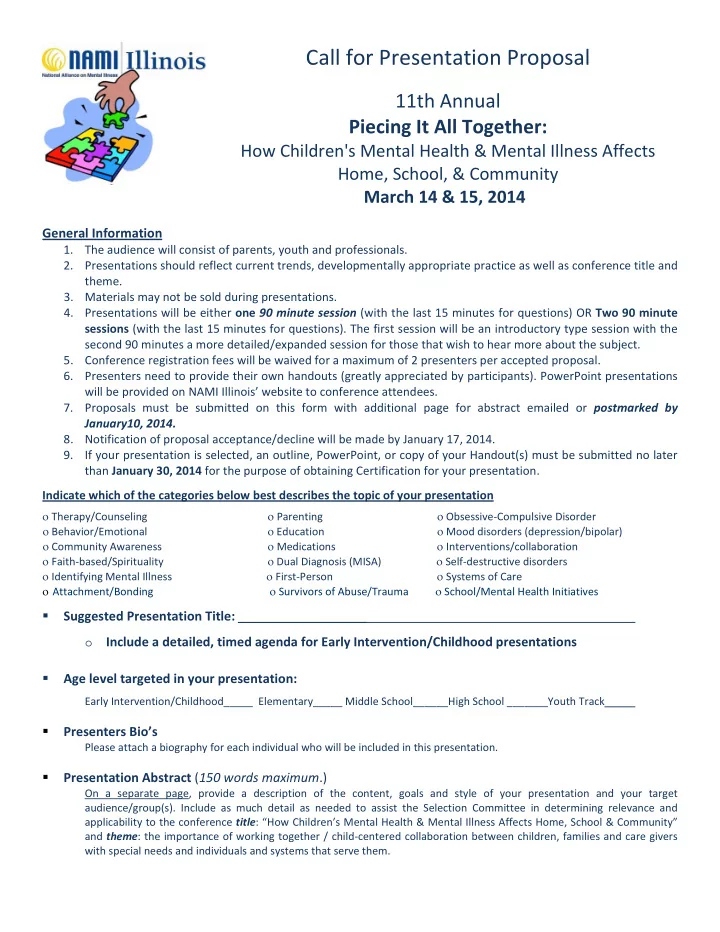

Call for Presentation Proposal 11th Annual Piecing It All Together: How Children's Mental Health & Mental Illness Affects Home, School, & Community March 14 & 15, 2014 General Information 1. The audience will consist of parents, youth and professionals. 2. Presentations should reflect current trends, developmentally appropriate practice as well as conference title and theme. 3. Materials may not be sold during presentations. 4. Presentations will be either one 90 minute session (with the last 15 minutes for questions) OR Two 90 minute sessions (with the last 15 minutes for questions). The first session will be an introductory type session with the second 90 minutes a more detailed/expanded session for those that wish to hear more about the subject. 5. Conference registration fees will be waived for a maximum of 2 presenters per accepted proposal. 6. Presenters need to provide their own handouts (greatly appreciated by participants). PowerPoint presentations will be provided on NAMI Illinois’ website to conference attendees. 7. Proposals must be submitted on this form with additional page for abstract emailed or postmarked by January10, 2014. 8. Notification of proposal acceptance/decline will be made by January 17, 2014. 9. If your presentation is selected, an outline, PowerPoint, or copy of your Handout(s) must be submitted no later than January 30, 2014 for the purpose of obtaining Certification for your presentation. Indicate which of the categories below best describes the topic of your presentation Therapy/Counseling Parenting Obsessive ‐ Compulsive Disorder Behavior/Emotional Education Mood disorders (depression/bipolar) Community Awareness Medications Interventions/collaboration Faith ‐ based/Spirituality Dual Diagnosis (MISA) Self ‐ destructive disorders Identifying Mental Illness First ‐ Person Systems of Care Attachment/Bonding Survivors of Abuse/Trauma School/Mental Health Initiatives Suggested Presentation Title: ____________________ o Include a detailed, timed agenda for Early Intervention/Childhood presentations Age level targeted in your presentation: Early Intervention/Childhood_____ Elementary_____ Middle School______High School _______Youth Track Presenters Bio’s Please attach a biography for each individual who will be included in this presentation. Presentation Abstract ( 150 words maximum .) On a separate page, provide a description of the content, goals and style of your presentation and your target audience/group(s). Include as much detail as needed to assist the Selection Committee in determining relevance and applicability to the conference title : “How Children’s Mental Health & Mental Illness Affects Home, School & Community” and theme : the importance of working together / child ‐ centered collaboration between children, families and care givers with special needs and individuals and systems that serve them.
If your presentation will be targeted towards Early Intervention/Childhood you MUST include the following: Which of the Early Intervention Principles the session addresses and “how” (in 50 ‐ 100 words) it addresses the “needs of children, birth to 3” and that principle. (A list of Principles can be found at the end of this application) Presentation Learning Objectives 1. __ 2. __ 3. __ Please fill out completely Name Professional Title __ Affiliation Mailing Address __ City State Zip __ Phone (area code) Email__ _____________ If applicable: Co ‐ presenter’s name Professional Title __ Affiliation Mailing Address __ City State Zip Phone (area code) _______ ( Correspondence will be sent ONLY to the primary presenter) Contact information for 2 references regarding prior presentations: 1) Name_______________________________________________ 2) Name_________________________________________ Address______________________________________________ Address_______________________________________ ____________________________________________________ ______________________________________________ Phone_______________________________________________ Phone________________________________________ What Audio ‐ Visual equipment will you use for your presentation? ______________________________________________________ What Audio ‐ Visual equipment will you need us to provide? ____________________________________________________________ Preferred length of presentation: 90 min Two 90 min sessions with first session an introductory and second session to follow with more details Your fee: ___________ Estimated expenses that you would like us to pay: ___________ In ‐ kind contribution? ( no fee charged & recognized as a collaborator in the conference flyer/program booklet ) YES_____ NO ____ Preferred : Friday Saturday / A.M. P.M. No Preference (Preferences will be honored when possible, but cannot be guaranteed.) SUBMISSION CHECKLIST Please submit one completed proposal postmarked or emailed by C OMPLETED C ALL F OR P ROPOSAL (CFP) January 10, 2014 to: B IOGRAPHIES FOR ALL PRESENTERS NAMI Illinois, 218 West Lawrence, Springfield, IL 62074 A BSTRACT namiil@sbcglobal.net A DDITIONAL I NFORMATION For more information, please call: NAMI Illinois (217) 522 ‐ 1403 O THER : You will be notified by email by January 17, 2014
The Illinois Interagency Council on Early Intervention's "Principles of Early Intervention" guide the outcomes we hope to achieve through our Early Intervention Training Model. The seven principles are: 1. The primary goal of EI is to support families in promoting their child's optimal development and to facilitate the child's participation in family and community activities. 2. The focus of EI is to encourage the active participation of families in the therapeutic process by imbedding intervention strategies into family routines. It is the parents who provide the real early intervention by creatively adapting their child care methods to facilitate the development of their child, while balancing the needs of the rest of their family. 3. EI requires a collaborative relationship between families and providers, with equal participation by all those involved in the process. An on-going parent-professional dialogue is needed to develop implement, monitor, and modify therapeutic activities. 4. Intervention must be linked to specific goals that are family-centered, functional, and measurable. Intervention strategies should focus on facilitating social interaction, exploration, and autonomy. 5. Intervention should be integrated into a comprehensive plan that encourages transdisciplinary activities and avoids unnecessary duplication of services. The plan should be built around family routines, with written home activity programs to encourage family participation in therapeutic activities on a daily basis. 6. Intervention should be monitored periodically to assure that the strategies implemented are successful in achieving outcomes. 7. Children and their families in the Early Intervention System deserve to have services of the highest quality possible. High standards will be set for the training and credentialing of administrative and intervention staff. Training, supervision, and technology will be focused to achieve excellence.
Recommend
More recommend